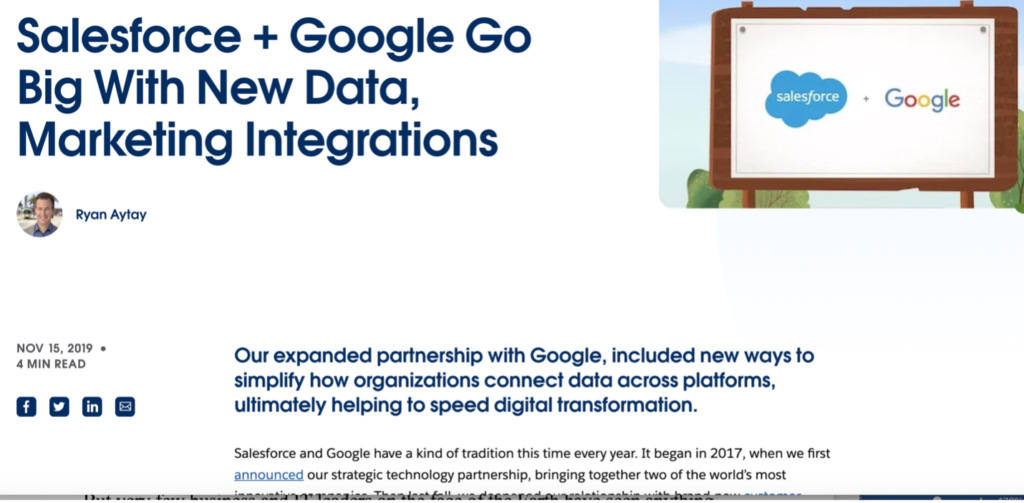While the sizzling Salesforce-Amazon cloudmance drew plenty of attention last week, Salesforce is simultaneously being appropriately promiscuous with Microsoft Azure even as it appears to be turning a cold shoulder to Google Cloud.
Boy oh boyzee, talk about an A-list soap-opera scenario! Here in one steamy menage a quatre, we’ve got the world’s four largest and most-influential cloud vendors vying for customer love, attention and most of all revenue. On my weekly Cloud Wars Top 10 rankings, Microsoft is #1, Amazon is #2, Google Cloud is #3, and Salesforce is #4.
“AWS and Salesforce Announce Expansive Partnership to Unify Developer Experiences and Launch New Intelligent Applications,” blared the headline on Salesforce’s website.
AWS took a rather more sober approach by simply linking to the Salesforce press release under the broad ongoing section called AWS and Salesforce: Global Strategic Partnership.
So that’s it, right? Salesforce has betrothed itself to AWS and will forever unto it be true?
Not so fast!
The melodramatic entanglements with Microsoft and Google Cloud arise if we turn back the clock about 18 months, when Salesforce pulled a bit of a shocker by downsizing its relationship with AWS and throwing a great deal more affection—and business—toward Microsoft and Azure.
At that time, in Amazon Jilted as Salesforce and Microsoft Pair Up for IaaS and Teams, I described how Salesforce had dropped AWS as the infrastructure provider for its highly strategic Marketing Cloud and given that plum business to Microsoft Azure:
The new cloudmance between Salesforce and Microsoft represents a stinging blow to Amazon, which only a few years ago was smothered in Salesforce affection as its one and only “preferred public cloud infrastructure provider.”
Yeah, I know, ‘the only constant is change’ and all that. But let’s put this dramatic move by Marc Benioff into the proper perspective. And then tell me if you think the nature of these changes is making Jeff Bezos and Andy Jassy feel good about their competitive posture with Microsoft.
Salesforce has just tightly aligned its three powerhouse clouds—Marketing, Sales and Service—with Microsoft. Marketing Cloud will now run on Azure—a huge win for Microsoft—and Sales Cloud and Service Cloud will now be closely integrated with Microsoft Teams collaboration solutions.
And in the corresponding press release announcing that deal on Nov. 14, 2019, Microsoft.com used this headline: Microsoft and Salesforce expand strategic partnership to accelerate customer success.
Hmm—kinda has a similar ring to last week’s Salesforce/AWS headline, doesn’t it?
- June 2021: “AWS and Salesforce Announce Expansive Partnership…”
- November 2019: “Microsoft and Salesforce expand strategic partnership…”
So what about Google? Does it have a chance of winning a slice of Salesforce’s big heart?
Well, if we once again jump in the Wayback Machine and scoot back to Nov. 15, 2019—one day after Salesforce and Microsoft went public with their intensified affections—we see that Salesforce was also dangling a carrot to Google Cloud, although that carrot didn’t seem to be nearly as snazzy as the one Microsoft got:

In light of some of the pulsing public reaction to last week’s AWS-Salesforce news, plus the plum role that Microsoft has with Salesforce Marketing Cloud and Teams integrations, I don’t think we could blame the folks at Google Cloud if they feel like the odd hyperscaler out: “I really like you, but I just want to be friends. I’ll call you—I promise.”
And perhaps Marc Benioff observes the deep and deepening relationship that Google Cloud continues to form with Salesforce rival SAP and figures that he’ll take his primary affections elsewhere.
The romantic reality
I frequently note that the enterprise cloud is the greatest sustained growth market the world has ever seen. The big-time players in today’s drama—Microsoft, Amazon, Google, and Salesforce—understand full well that in a market that’s this big and that is growing this fast and that is changing at the speed of digital business, alliances and partnerships can wax and wane, and then wax again and very likely wane again.
That is the immutable nature of the Cloud Wars because the #1 priority for all of these world-class cloud vendors is to dazzle and delight their customers, not to fuss unduly over the feelings of partners that are unquestionably acting in their own self-interests as well.
RECOMMENDED READING
Oracle Challenges SAP, Microsoft, Salesforce over Industry-Cloud Suites
Is Salesforce Going to War with Oracle, Workday, SAP in HR?
The Marc Benioff Show: Inside Salesforce’s Greatest Quarter Ever
Microsoft CEO Satya Nadella Is World’s #1 CEO: 5 Reasons Why
Oracle CEO Safra Catz More Bullish Than I’ve Ever Seen: 10 Examples
Larry Ellison Shows His Cards: Oracle ERP Revenue Could Reach $30B
Meet Google Cloud’s Secret Weapon: OCTO
Salesforce Targets ServiceNow: Slack Delivers “Human Workflow”
SAP Buries the Past: Calls Out Legacy ERP, Welcomes Modular Cloud ERP
Disclosure: at the time of this writing, Google Cloud and Salesforce were among the many clients of Cloud Wars Media LLC and/or Evans Strategic Communications LLC.
Subscribe to the Industry Cloud Newsletter, a free biweekly update on the booming demand from business leaders for industry-specific cloud applications.










